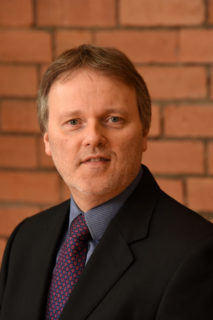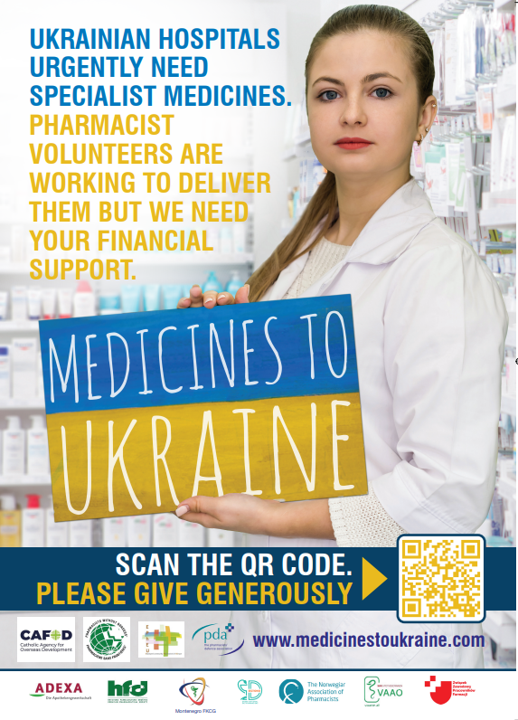Background: The lessons from Ukraine
PDA members will be aware that because of my role as Secretary General of EPhEU (the umbrella body for pharmacist employee representative organisations in Europe), following the Russian invasion of Ukraine, a solution had to be found to handle the requests for help from Ukrainian members who had seen hundreds of their hospitals and vast amounts of medicines and equipment destroyed in the war.
Their main issue was that whilst the numbers of severe casualties was colossal and increasing daily, the specialist hospital medicines used to treat them were either running low or were no longer available at all in Ukraine.
The scheme devised, entailed posters going out which were being displayed in community pharmacy windows to attract the support of members of the public across many of the European countries. The request was that they do not send boxes to the border, but instead that they make financial donations to the pharmacist led scheme via a QR code prominently displayed on the poster. Irrespective of which country they were in, the links went to a single message, told in their language on a specifically designed website.
The story also explained that medicines were not normal items of commerce, that they needed special procurement, proper transportation conditions, and extra security, and that this entire programme was being handled by volunteer pharmacists.
Each EPhEU member had put in place an arrangement with a local charity in their country to receive the money and ensure that no pharmacy organisation ever handles any of the funds raised. Periodically, the funds gathered in this way can be pooled, enabling substantial purchases to be made.
Some countries with existing well established pharmacy humanitarian charity arrangements in place at the start of the crisis were able to get going with their fundraising for Ukraine very promptly. Countries like Germany, Austria and France operated powerful and comprehensive fundraising initiatives that went way beyond any EPhEU poster campaign, and they were ready to commence their fundraising in March 2022 when the crisis first started and when the public was at its most interested. Those countries that did not (like the UK) took much longer to get the framework set up.
In the UK, the scheme was launched in July 2022, posters, and a detailed explanation of the Medicines to Ukraine scheme was distributed to all pharmacies in the UK. Some PDA members will recall that I personally accompanied the first consignment of Medicines to Ukraine in the Summer.
Lessons learned
Now that the Ukrainian humanitarian crisis has been running for several months it pays to take stock of what has happened and what important lessons have been learned.
- Overall, since the humanitarian crisis in Ukraine started, the funds for Ukraine gathered by the several pharmacy charity partners from members of the public, pharmacy owners, manufacturers and wholesalers and pharmacy supporting organisations across the EPhEU countries have exceeded more than £2.5 million and this has enabled more than 154 transports of medicines and surgical dressings to go to Ukraine.
- Those countries that already had pre-existing and well-established humanitarian fundraising arrangements in place at the very start of the crisis when the public interest was at its peak were responsible for around 80% of that amount. They were able to raise funds from sources and initiatives that went way beyond the reach of our poster campaign. In the UK no such pre-existing arrangement was in place and the sums gathered to date here are just over £200,000.
- Across the continent, the interest amongst pharmacy owners in displaying the Meds to Ukraine posters has been greater than here in the UK.
- With awareness meetings being held in the parliaments of England, Scotland, and Wales to publicise the scheme (NI currently has no parliament operating) it is clear that what we are doing is highly appreciated and the awareness of influential politicians as to the work of pharmacists has been highly beneficial for our profession.
The scheme has been a success but there is still much to do. Sadly, in the UK, unlike on the continent, it has not yet been possible to enlist the material support of other pharmacy organisations, nor of many pharmacy owners. A poster has been sent by post to every single community pharmacy in the UK, how many have you seen displayed? Despite this, and through the collaboration of the EPhEU partner countries the scheme continues to deliver specialist hospital medicines to Ukraine with another large 200,000 Euro consignment planned for the Christmas period.
In meetings with many stakeholders and increasingly with politicians, I sense that they are enormously impressed by the fact that the unique expertise of pharmacists coupled (through EPhEU) with a framework for international collaboration of pharmacy organisations has demonstrated leadership in a time of crisis.
A powerful opportunity exists for pharmacy leadership in global humanitarian crises
Since the launch of the Medicines to Ukraine scheme, quite a few PDA members asked whether there was anything additional that could be done to also help with crises in other parts of the world.
Whilst the initial focus has been on Ukraine because Ukrainian EPhEU members asked their European membership organisation for help, what is clear is that the architecture of this scheme lends itself to raising funds and delivering medicines to any crisis, whether this is a natural disaster or a manmade one anywhere in the world.
The formula is not complex and involves the following components;
- Pharmacy organisations in the regional countries across the world put in place a charity partnership agreement in their country which means that funds generated can be deposited with a charity organisation and then released to pay for medicines when required.
- A medicines procurement facility in the region is secured.
- A reliable contact with the government of the country where the crisis has occurred is established.
- Posters designs are made ready for rapid deployment by simply inserting the respective flag of the future crisis and once printed, the national pharmacy organisations would then need to distribute them to the pharmacies for display purposes across all the countries in the region.
- A website framework, the electronic supporting machinery, and the necessary cyber security is prepared and made ready in advance of any (yet to occur) crisis.
To that end, I have spent the last four months involved in laying the foundations to set up the machinery that we have used for Medicines to Ukraine in other parts of the world. We already have the poster designs, the legal agreement templates for the charities and the website, cyber security, and electronic machinery in place. To enable our Medicines to ******* (next crisis) scheme to be ready, local pharmacy organisations across the world need to sign up charity partnerships in advance. Regional medicines procurement specialists need to be found and pre-emptive government contacts need to be developed. It is our intention to lean heavily on our new membership of the International Pharmaceutical Federation (FIP) to ensure that these last remaining items can be put into place ahead of another crisis.
Global reach through FIP
The FIP global congress was held in Seville at the end of September with more than 5,000 delegates attending. I was very fortunate to be invited to address the main plenary of this event and there, I appealed pharmacists and pharmacy organisations from all over the world to lend their support to a wider global humanitarian support project.
Once the elements described above can be secured, then pharmacy can be able to move very quickly as soon as a crisis develops as we now know how massively this improves the chances of success.
Developed in the right way, what started off as the Medicines to Ukraine scheme could become a Medicines to a country in Africa, Asia, the Middle East, South America, or any other place where a crisis emerges in the future.
Clearly, this project is deeply rooted in the importance of humanitarian support, but it is also driven by a desire to demonstrate that pharmacists can show leadership in times of crisis, it shows the world the value of pharmacists’ expertise. These objectives are surely those that we should all support, but if we are to succeed then we will need to be able to influence matters halfway around the world and this is why the PDA has now joined the International Pharmaceutical Federation (FIP).
Conclusion
The Medicines to Ukraine campaign has been one of the most ambitious and perhaps unusual projects that the PDA has ever been involved in. It has already achieved a lot, but there is a lot more need to satisfy with the ongoing war situation having no end in sight. PDA members were right to ask about other global crisis situations and this has prompted us to act.
To ensure that the project was solid, I accompanied the first large medicines consignment (value £200,000) to Ukraine when it was delivered to the Ukrainian Hospitals, and I appreciated enormously the fact that here in the UK we are fortunate to be living largely in peace and as we approach the festive season, I would ask all PDA members to reflect on that for themselves.
For those members who would like to be a part of this initiative, the PDAs first major initiative around humanitarian support, I would invite you to donate by clicking here.
Importantly, also, if you can persuade your employer to display a poster in their pharmacy window, or in the hospital or GP surgery waiting room wall, then this will not only improve the chances of success, but it will also get the message out to the public about the specialist nature of medicines and about the role of pharmacists in the process.
If you have an offer to display a poster from an employer, then please just let us know and we will post it immediately.
Thank you

By Mark Koziol, PDA Chairman
Learn more
- PDA joins pharmacy organisations across Europe to show solidarity with the people of Ukraine
- Mark Koziol’s report of his trip to Ukraine, delivering the initial consignment of supplies
- Sending Medicines to Ukraine
- International Pharmaceutical Federation (FIP), Medicines to Ukraine
- PDA joins International Pharmaceutical Federation (FIP)
Not yet a PDA member?
If you have not yet joined the PDA, we encourage you to join today and ask your colleagues to do the same.
Membership is FREE to pharmacy students, trainee pharmacists, and for the first three months of being newly qualified.
Read about our key member benefits here.
